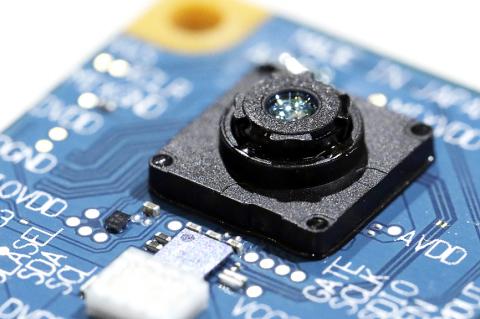Sony Corp, the biggest maker of camera chips used in smartphones, is boosting production of next-generation 3D sensors after customers, including Apple Inc, have shown interest.
The chips are to power front and rear-facing 3D cameras of models from several smartphone makers next year, with Sony kicking off mass production in late summer to meet demand, said Satoshi Yoshihara, head of Sony’s sensor division.
He declined to provide sales or production targets, but said that the 3D business is already operating profitably and would make an impact on earnings from the fiscal year starting in April.

Photo: Bloomberg
Sony’s bullish outlook for 3D cameras provides much-needed optimism to the global smartphone industry, which is suffering a slowdown as consumers find fewer reasons to upgrade devices.
The Tokyo-based company has started providing software toolkits to outside developers so that they can experiment with the chips and create apps that generate models of faces for communication or virtual objects for online shopping.
“Cameras revolutionized phones and, based on what I’ve seen, I have the same expectation for 3D,” said Yoshihara, who has worked for more than a decade on wider industry adoption of cameras in smartphones. “The pace will vary by field, but we’re definitely going to see adoption of 3D. I’m certain of it.”
Sony controls about half of the camera chip market and supplies customers including Apple, Alphabet Inc and Samsung Electronics Co, although Yoshihara declined to identify them by name, citing confidentiality agreements.
Huawei Technologies Co (華為) is employing Sony’s 3D cameras in next-generation models, people familiar with the matter told Bloomberg earlier this month.
Sony is not the only maker of 3D chips, with rivals Lumentum Holdings Inc and STMicroelectronics NV already finding uses for them, such as unlocking phones through facial recognition or measuring depth to improve focus when taking pictures at night.
To be sure, demand for Sony’s technology is untested and it remains to be seen if consumer interest in 3D would be enough to snap the smartphone market out of its funk. Annual global shipments probably fell 3 percent this year with growth of just 2.6 percent expected for next year, International Data Corp said.
Yoshihara also said there will only be a need for two 3D chips on devices, for the front and back, despite a trend by smartphone makers to have three or more cameras.
During the interview, Sony showed several examples using a custom phone with a 3D camera on its rear.
In one app, users made specific hand gestures to cast magic spells inside a virtual game. In another, the phone calculated the depth of the room and accurately displayed a virtual goldfish swimming in front of and behind real-life objects.
“The most important thing in the coming year will be to get people excited,” Yoshihara said.

CAUTIOUS RECOVERY: While the manufacturing sector returned to growth amid the US-China trade truce, firms remain wary as uncertainty clouds the outlook, the CIER said The local manufacturing sector returned to expansion last month, as the official purchasing managers’ index (PMI) rose 2.1 points to 51.0, driven by a temporary easing in US-China trade tensions, the Chung-Hua Institution for Economic Research (CIER, 中華經濟研究院) said yesterday. The PMI gauges the health of the manufacturing industry, with readings above 50 indicating expansion and those below 50 signaling contraction. “Firms are not as pessimistic as they were in April, but they remain far from optimistic,” CIER president Lien Hsien-ming (連賢明) said at a news conference. The full impact of US tariff decisions is unlikely to become clear until later this month

GROWING CONCERN: Some senior Trump administration officials opposed the UAE expansion over fears that another TSMC project could jeopardize its US investment Taiwan Semiconductor Manufacturing Co (TSMC, 台積電) is evaluating building an advanced production facility in the United Arab Emirates (UAE) and has discussed the possibility with officials in US President Donald Trump’s administration, people familiar with the matter said, in a potentially major bet on the Middle East that would only come to fruition with Washington’s approval. The company has had multiple meetings in the past few months with US Special Envoy to the Middle East Steve Witkoff and officials from MGX, an influential investment vehicle overseen by the UAE president’s brother, the people said. The conversations are a continuation of talks that

CHIP DUTIES: TSMC said it voiced its concerns to Washington about tariffs, telling the US commerce department that it wants ‘fair treatment’ to protect its competitiveness Taiwan Semiconductor Manufacturing Co (TSMC, 台積電) yesterday reiterated robust business prospects for this year as strong artificial intelligence (AI) chip demand from Nvidia Corp and other customers would absorb the impacts of US tariffs. “The impact of tariffs would be indirect, as the custom tax is the importers’ responsibility, not the exporters,” TSMC chairman and chief executive officer C.C. Wei (魏哲家) said at the chipmaker’s annual shareholders’ meeting in Hsinchu City. TSMC’s business could be affected if people become reluctant to buy electronics due to inflated prices, Wei said. In addition, the chipmaker has voiced its concern to the US Department of Commerce

STILL LOADED: Last year’s richest person, Quanta Computer Inc chairman Barry Lam, dropped to second place despite an 8 percent increase in his wealth to US$12.6 billion Staff writer, with CNA Daniel Tsai (蔡明忠) and Richard Tsai (蔡明興), the brothers who run Fubon Group (富邦集團), topped the Forbes list of Taiwan’s 50 richest people this year, released on Wednesday in New York. The magazine said that a stronger New Taiwan dollar pushed the combined wealth of Taiwan’s 50 richest people up 13 percent, from US$174 billion to US$197 billion, with 36 of the people on the list seeing their wealth increase. That came as Taiwan’s economy grew 4.6 percent last year, its fastest pace in three years, driven by the strong performance of the semiconductor industry, the magazine said. The Tsai